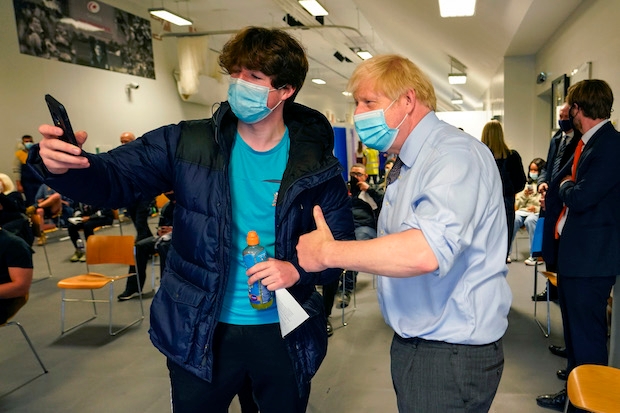When the cabinet met on Tuesday, ministers agreed that once the roadmap is complete the country will be able to live with Covid — even if cases continue to rise. The implication is that so long as the vaccines continue to work, there will be no going back after 19 July. There is increased optimism over that date as the day of the final easing. It is, in part, out of necessity.
Not only are Tory MPs on the rampage about the four-week delay from 21 June, but ministers also sense a growing backlash among the public over the half and half rules which mean full capacity for the Wimbledon final yet leave restaurants only able to fill a portion of their capacity. The appointment of Sajid Javid as Health Secretary has also tipped the balance of the inner Cabinet in favour of the hawks – with Javid publicly stating his desire to lift all restrictions as soon as possible.
Tory MPs on the rampage about the four-week delay from 21 June
Yet even if 19 July is on course, there remain questions over how ‘normal’ life is come so-called freedom day. At present, all legal requirements on social distancing are expected to go — with limits on group sizes lifted along with the two metre rule. The legal need to wear a face mask is also expected to be lifted in most, if not all, settings. It could stay in place on public transport – with Department for Transport officials taking the view that a lifting of mask rules would actually put commuters off travel.
Where questions remain is self-isolation rules, school procedures, travel and how heavy the health guidance will be. Tory MPs worry that any guidance on keeping a distance or wearing a face mask where for example good ventilation isn’t possible could tie the hands of hospitality businesses who will feel a need to follow it on insurance grounds.
International travel won’t return to normal anytime soon. While there will be exemptions from quarantine for the double-vaccinated in the future, ministers take the view that the priority ought to be domestic freedoms. It follows that in the current debates over the blueprint for 19 July, an easing on travel rules for the vaccinated could be delayed until later that month.
Ministers are also considering plans to allow the double vaccinated to avoid quarantining for ten days should they come into close contact with someone who has Covid. There has been a trial of this — which Michael Gove was conveniently a part of — that has apparently led to promising results. But while it’s been heralded as a path back to normality, it also points to how 19 July will be different to life before the pandemic.
For all the talk of treating Covid like flu, under the current plans being mooted the single-jabbed (which will be the bulk of thirty-somethings and under on 19 July) would still face legally enforced quarantine if they interact with someone who tests positive for Covid. That will affect consumer behaviour if a night out comes with the risk of ten days stuck indoors. ‘It could be pretty dysfunctional,’ says one government aide. It also means that despite a promise of no vaccine passports, the unvaccinated will be living under different rules than the vaccinated.
The other area where this will be visible is schools. Department for Education data shows that on 24 June, 375,000 children did not attend school for Covid related reasons. Ministers have pledged to revise the current class bubble system when pupils return from the end of the summer holidays. However, the proposed solution involves more testing — with schools told to prepare for mass testing in September as an alternative to isolation.
Tory MPs have already started to grumble about this on the grounds that once the vulnerable are vaccinated, children ought not to be subjected to testing given they are not in an at-risk group. It’s for these reasons that learning to live with Covid may be more painful than ministers are currently letting on.







Comments